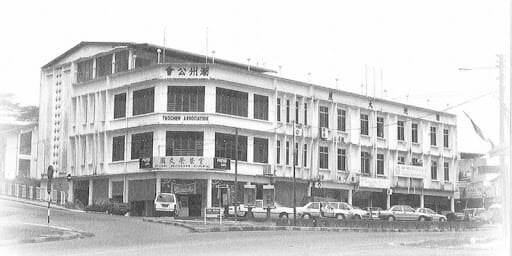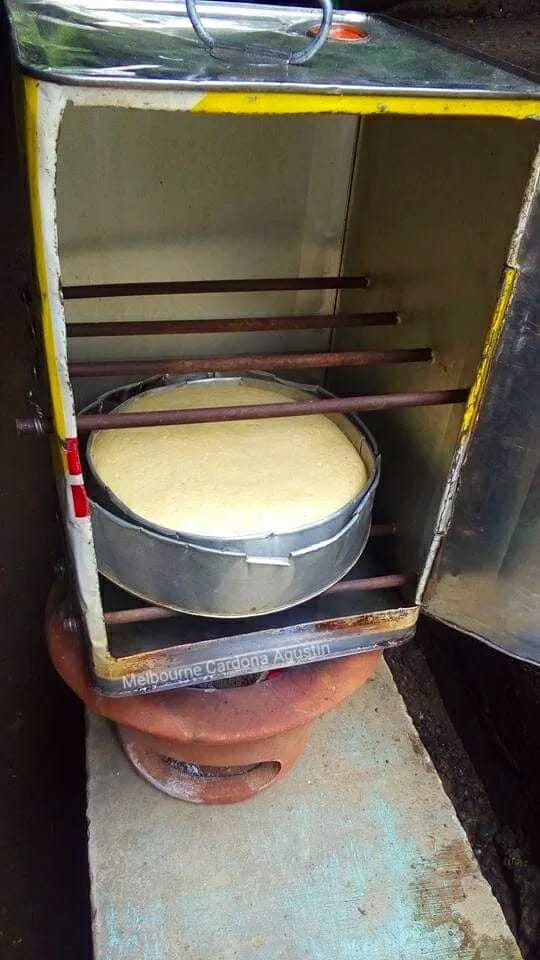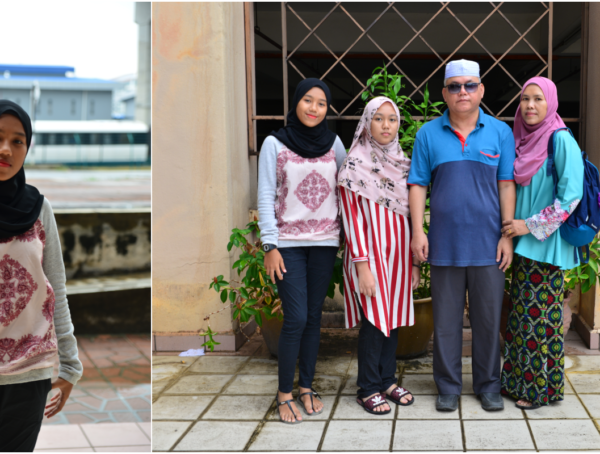In Sarawak, there is a little town called Serian.
 [Image via Kuching Teochew Association]
[Image via Kuching Teochew Association]
At first glance, one might not pay attention to this shop lot, after all, it has long been abandoned and taken over by creepy crawlies.
But more than 60 years ago, this wooden double-story shop lot was a bustling place, with customers flowing in and out to buy food and goods from one particular Teochew man.
The shop lot was this man’s bread and butter. For with this tiny building, he managed to single-handedly raise all 9 of his children. This is his story.
Fate dealt Uncle K a cruel blow.
This man, Uncle K, ran a grocery store with his wife on the ground floor of their shop lot.
The shop lot was made from wood and sat on strong timber stilts. Life passed by peacefully for the couple.
They would tend to the shop by day and then retire upstairs with their 9 children (6 girls and 3 boys) by evening. Life was simple but happy.
But then fate decided to deal them with a blow.
Not long after their youngest turned 3, Uncle K’s wife passed away from lung cancer.
And with her passing, Uncle K had to act as both the father figure and mother figure.
His third daughter, then, aged 9, volunteered to drop out of school to help look after the younger siblings, while the older children continued to study at a boarding school in Kuching.
Back in the 60s, it was a norm for children to drop out of school to help their families out. This is especially so if the families who were struggling financially.

[A photo of the youngest son with his family.]
Uncle K learnt to do everything on his own.
Previously, Uncle K’s wife was in charge of all their meals, laundry, and housekeeping. And with her passing, he had to learn to do all that from scratch.
Dinners became a combination of burnt rice and undercooked veggies, while spiders and mice started to multiply within their home.
Life was not easy. If his children got sick, he had to tend to them, all while looking after his shop.
The ones who were ill would get a bigger portion of food, while the healthy ones would share the remaining portion. And if they fought, he had to discipline them.
Sometimes, he got so tired and frustrated he would ignore their cries.
A kind relative offered to matchmake him with another woman, to help ease his burdens. But all his children were against it.
And because he loved them, he declined the offer. Instead, he vowed to make life better for his children.
His children had close brushes with danger.
His 9-year-old had to carry her youngest brother, then 3 on her back while she washed their clothes by the river.
Once, she thought she saw a wooden log floating by, but as it passed by, it blinked. She realized she was within 2 feet of a fully-grown crocodile — but God spared her that day, and it swam away.

Another time, the two older boys tried to be adventurous and borrowed a wooden boat from their neighbor.
They had wanted to paddle the boat down the stream and then head back up, but on the way down the stream, the boat capsized.
And while the stream was not very deep, the current was very strong. The capsized boat was washed away, and the boys had to trek through the jungle to make their way back to the shop.
It was only after the sun had gone down when they finally arrived home, to an extremely worried father.
He thought that he had lost both his boys forever. So imagine his joy when he saw his beloved sons walking trudging back home, all covered in mud and sweat.
Uncle K had probably wanted to hug them and shed tears of relief, but he had to discipline them for their naughtiness.
And with no mother figure around to do the punishing, the boys were treated to a lashing by Uncle K with a long rattan stick.
They improved the shop’s economy.
The late 1960s saw the conflict around communism in Sarawak start to resolve, slowly but surely.
This was due to the Goodsir Plan initiated by the Sarawak Government – this saw the resettlement of roughly around 7,500 people along the Kuching-Serian road in Sarawak.
Uncle K saw this as an opportunity to improve the shop’s economy, so he and his older children decided to sell more goods.
He had the children go around on weekends to collect cotton from cotton trees to make pillows for sale.
During the school holidays, the older siblings would fry noodles with soya sauce to sell them to the locals.
Each pack of noodles with chili sauce would cost around 20 cents.
And when it was nearing festive seasons, Uncle K would cut open unused biscuit tins and modify them into mini charcoal stoves.

[An image of how biscuit tins can be fashioned into makeshift ovens. Source.]
His girls would then make the batter for Kuek Sepit while the boys would take turns baking the batter over their homemade ovens.
Uncle K made sure his kids had proper education.
Uncle K was not an educated man, but he made sure that his children received a proper education.
The second son graduated from university while the other two sons grew up to work in the civil service.
Three of his daughters became teachers; one, a nurse; and two, homemakers.
And even though his third daughter had to forgo a life of education, he would encourage her to browse through newspapers and learn from her siblings.
During her time at the shop, she had helped to cut and curl the hair of the locals, so when she grew up, she worked as a hairdresser before finally settling down.
Today, she is a proud grandmother of 4 who converses in the Iban, Hakka, Teochew, and Hokkien dialects as well as the English language (thanks to her grandchildren who only speak in English with her).
Her younger siblings fondly call her ‘sa-che’ and would never miss the opportunity to thank her for looking after them when they were younger.

[Photo taken in 2014. The sisters, from left: 3rd, 2nd, 1st, 4th, 6th sister. (5th sister not in photo) ]
One by one, each child grew up.
One by one the children grew up and moved to different towns, and with no one left to tend to the shop, Uncle K finally gave in to his children’s advice, sold his unit to the neighbors, and retired.
He then moved in with his eldest son who had bought another shop lot nearby. Uncle K passed away in his sixties and is survived by all his 9 children, all of whom have families of their own.
Now in their golden years, they gather together whenever they can to reminisce about their life from long ago.
Yearly trips are made back to their hometown to see the old wooden shop on stilts, where they had grown up, crying, fighting, and laughing.
They would recall how their father had punished the oldest sister for accidentally dropping the youngest sibling onto the floor as a baby.
And how the third sister had fought with the neighbor’s kids for calling them ‘motherless children’.
They’d also trade recipes with their third sister who had become an extremely good cook from all the trials and errors she had learned as a child.
Yes, tears were aplenty back then, but now, they recall their childhood memories with smiles on their faces.
Uncle K taught them the value of frugality.
One of the many teachings that Uncle K had passed on to them was the importance of frugality.
Even to this day, the siblings would practice reusing and repairing household items and finish up all their food so as not to let them go to waste.

They all agree that their father was a very strict man, one who spoke seldom and only when necessary.
But they also agree that he loved them and their mother dearly. And for that, they are extremely grateful and honored to have had him as their father.
For more stories like this, read: A Mother’s Love – How My Great Grandmother Sailed The Seas From China To Malaysia To Give Her Daughter A Better Life and 5 Things Our Grandparents Did That We Don’t Do Anymore.

You might also like
More from Real People
‘A RM100 fee cost a company 5 years of revenue’ shares M’sian
This story is about a Malaysian who learned that bureaucracy can be defeated simply by not arguing with it.A billing …
‘I quiet-quit, upskilled, and tripled my salary,’ shares M’sian engineer
This story is about a Malaysian who learned that loyalty without leverage leads nowhere in the corporate world.After years of …
‘I did everything right, and it still wasn’t enough’ shares M’sian graduate
This story is about a Malaysian graduate navigating big dreams in a job market where a degree no longer guarantees …

















